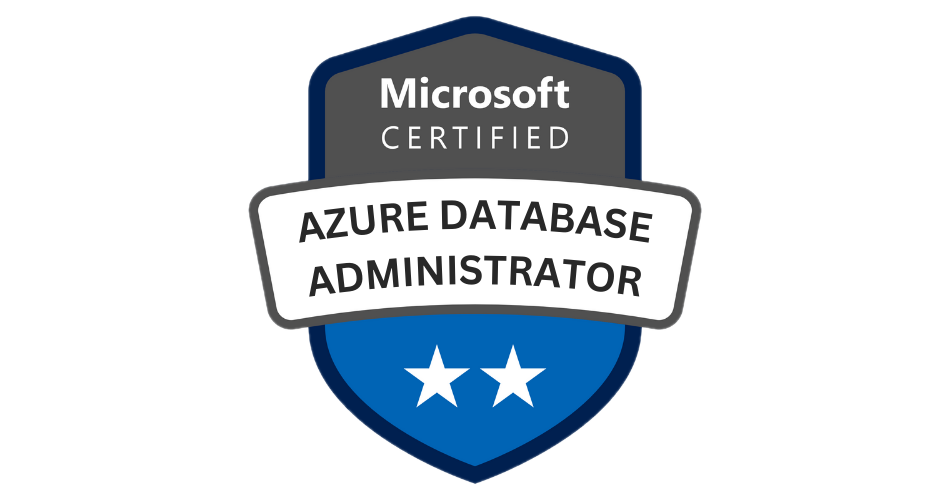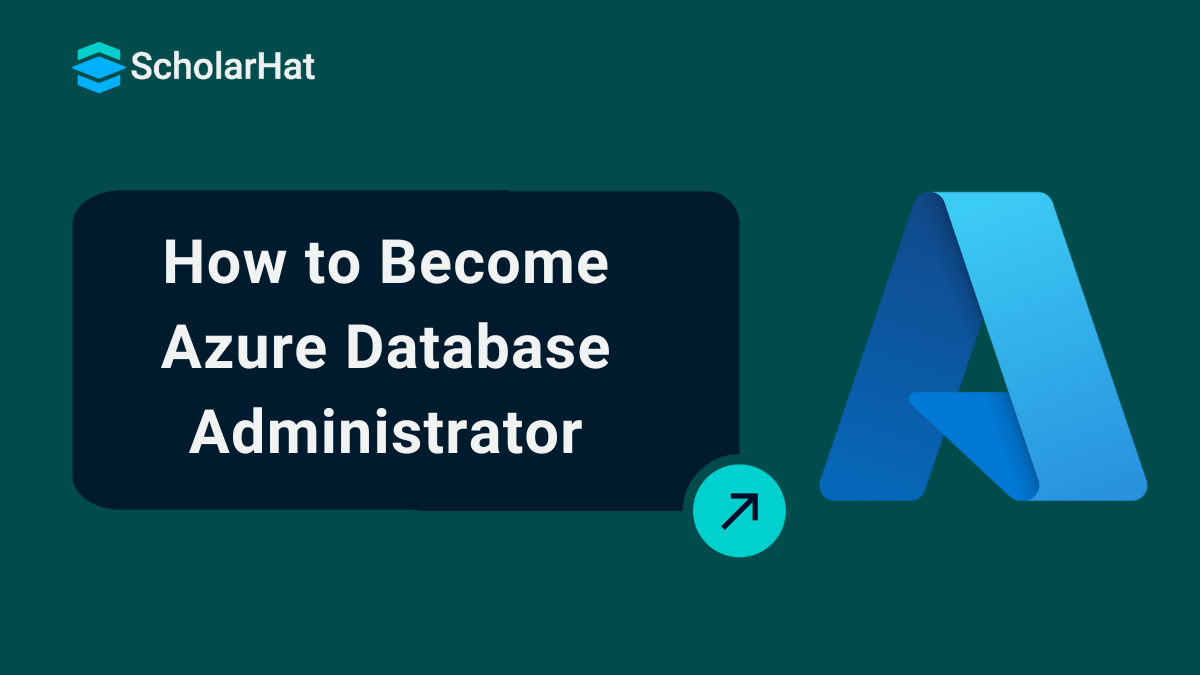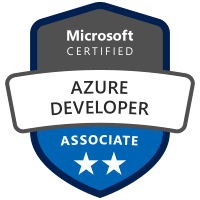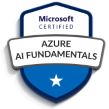14
DecAzure Database Administrator: A Comprehensive Guide
Azure Database Administrator: Detailed Description
Azure Database Administrator manages cloud databases and is an expert in keeping an organization's data secure, accessible, and running smoothly in Microsoft's Azure ecosystem.
In this Azure Tutorial, We will see how to become an Azure database administrator including its certification exam, fee, roles, and responsibilities. Certified Azure professionals earn 20% more than non-certified peers. Get your Free Azure Course with Certification today!
Who Is an Azure Database Administrator?
An Azure Database Administrator manages Azure cloud-based databases to ensure performance, availability, and security. Their responsibilities include:
- Database Deployment: Setting up and configuring Azure SQL databases and other Azure database services.
- Performance Tuning: Optimizing database operations and resolving performance bottlenecks.
- Security Management: Ensuring databases are secure by implementing access controls, firewalls, and encryption.
- Backup and Recovery: Setting up automated backups and recovery solutions.
- Monitoring and Maintenance: Using tools to track database health and perform regular updates.
How to Become an Azure Database Administrator
1. Understand the Core Skills
To excel as an Azure DBA, you need the following skills:
- Database Fundamentals: Knowledge of relational and non-relational databases.
- SQL Proficiency: Strong SQL query writing and database scripting skills.
- Azure Cloud Knowledge: Familiarity with Azure services, particularly Azure SQL, Azure Database for PostgreSQL, and Azure Cosmos DB.
- Security Management: Understanding of data encryption, firewalls, and role-based access control (RBAC).
- Monitoring Tools: Experience with Azure Monitor and other database performance monitoring tools.
2. Learn Microsoft Azure Basics
Start with the fundamentals of Microsoft Azure by:
- Enroll in the Microsoft Azure Fundamentals (AZ-900) course to gain a high-level understanding of Azure services.
- Familiarize yourself with the Azure portal, CLI, and PowerShell commands.
3. Deepen Your Knowledge of Databases
Focus on Azure's database solutions by exploring:
- Azure SQL Database: Learn about deployment, scalability, and maintenance.
- Azure Data Factory: Understand data integration and transformation.
- Cosmos DB and NoSQL Databases: Study non-relational database concepts.
| Read More: Azure Data Factory Interview Questions |
4. Get Hands-On Experience
Practical experience is critical. Use the Azure free tier to create and manage databases. Work on projects such as:
- Setting up a highly available Azure SQL Database.
- Implementing database security policies.
- Configuring automated backup and recovery processes.
5. Prepare for the DP-300 Exam
The DP-300 exam validates your ability to manage Azure databases. Here's how to prepare:
- Access the Microsoft Learning Path for comprehensive resources.
- Enroll in training platforms like Pluralsight, Udemy, or LinkedIn Learning.
- Practice with hands-on labs and tools like Terraform, Docker, and Kubernetes.
- Use practice exams from platforms like Whizlabs or MeasureUp.

6. Schedule and Pass the DP-300 Exam
- Exam Fee: $165 (₹4,800 in India).
- Format: Multiple-choice and scenario-based questions.
- Duration: 120 minutes.
- Passing Score: 700 out of 1000.
- Book your exam through the Microsoft Certification Dashboard.
7. Tips to Succeed as an Azure DBA
- Stay Updated: Keep up with Azure's frequent updates and new features.
- Build a Portfolio: Showcase projects and achievements with Azure databases.
- Join Communities: Participate in forums like Microsoft Tech Community or LinkedIn groups.
- Practice Consistently: Use Azure labs to sharpen your skills.
Roles and Responsibilities of Azure Database Administrator
An Azure Database Administrator's role includes design, implementation, and maintenance. Here are some of the primary tasks:
1. Database Deployment and Management
- Set up and configure Azure database resources like SQL Databases or Cosmos DB.
- Define and implement schemas and optimize queries for performance.
2. Backup and Recovery
- Design and execute robust backup policies using Azure's built-in tools.
- Data recovery strategies align with Recovery Time Objective (RTO) and Recovery Point Objective (RPO) requirements.
3. Monitoring and Performance Tuning
- Use tools like Azure Monitor, SQL Insights, and Query Store for real-time monitoring.
- Identify and resolve bottlenecks by optimizing indexes, queries, and resource allocation.
4. Security and Compliance
- Use Azure Role-Based Access Control (RBAC) to restrict unauthorized access.
- Implement Transparent Data Encryption (TDE) and Advanced Threat Protection (ATP).
- Configure failover groups or auto-failover groups for high availability (HA).
- Configure geo-replication to maintain database availability across regions.
| Read More: Azure Administrator Salary in India |
Skills Required to Excel
Achieving success as an Azure Database Administrator requires a harmonious combination of technical proficiency and strong problem-solving skills. Key skills include:
1. Proficiency in Azure Services
- Deep knowledge of Azure SQL Database, Azure Cosmos DB, and other database services.
- Understanding of Azure Networking and Virtual Machines for hybrid scenarios.
2. Database Management Skills
- Expertise in SQL, T-SQL, or PL/SQL for query writing and optimization.
- Familiarity with database design principles and indexing strategies.
3. Automation and Scripting
- Use PowerShell, Azure CLI, or tools like Terraform for automating deployments.
- Write scripts for routine database maintenance tasks.
4. Monitoring and Troubleshooting
- Analyze logs using Log Analytics and Application Insights.
- Troubleshoot issues related to database connectivity, performance, and scaling.
Certifications and Learning
Microsoft Certified: Azure Database Administrator Associate is highly recommended. Stay updated with the latest Azure features and enhancements.
Tools Every Azure DBA Should Know
- Azure Data Studio: A lightweight, cross-platform editor for managing Azure SQL Databases.
- Azure Portal: For managing all Azure resources, including databases.
- Azure CLI: Command-line tool for automating database management.
- SQL Server Management Studio (SSMS): For SQL Server and Azure SQL databases.
- Azure Resource Manager (ARM): Templates for infrastructure as code.
Real-World Challenges and Solutions as an Azure Database Administrator
Scenario 1: Performance Bottlenecks
- Challenge: Slow query performance due to poorly designed indexes.
- Solution: Use Query Performance Insight to analyze long-running queries and optimize indexing strategies.
Scenario 2: Unexpected Downtime
- Challenge: Database outage affecting critical services.
- Solution: Set up Active Geo-Replication for failover and implement a clear disaster recovery plan.
Scenario 3: Security Threats
- Challenge: Unauthorized access to sensitive data.
- Solution: Use Azure Defender for SQL to detect vulnerabilities and enable auditing to monitor suspicious activities.
The Future of Azure Database Administration
As companies adopt cloud-native technologies, the role of Azure Database Administrators is evolving.
Key trends include:
- AI-Driven Automation: Tools like Azure Synapse Analytics use AI for performance tuning and workload management.
- Hybrid and Multi-Cloud: Admins need to manage data across various platforms for seamless integration.
- Data Governance: Compliance with growing regulations is a top priority.
Conclusion
The work of an Azure Database Administrator is more than just a job; it involves important responsibilities to secure an organization's most valuable asset: its data. Acquiring Azure certifications positions you as an important resource for any firm working in the Azure cloud world.
Cloud developers with Azure skills earn 30% more on average. Don’t miss out—join our Azure Developer Associate course today!
FAQs
Take our Azure skill challenge to evaluate yourself!

In less than 5 minutes, with our skill challenge, you can identify your knowledge gaps and strengths in a given skill.









